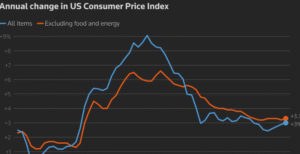$NG=F $BP $SHEL
#UK #energy #bills #inflation #Ofgem #gasprices #electricity #markets #economy #oilandgas #utilities #finance
Britain’s household energy bills are set to increase from April after the country’s energy regulator, Ofgem, announced a 6.4% rise in its quarterly price cap. The move comes as wholesale energy costs have climbed, leading to higher prices for suppliers and, ultimately, consumers. The regulator’s decision means that the average household energy bill will rise to around £1,928 per year, up from the current cap of £1,834. While this increase is still significantly lower than the record-high energy prices observed during the 2022 energy crisis, it signals a renewed strain on household finances at a time when inflationary pressures remain persistent. The change will affect millions of households across the UK, many of whom are already grappling with the rising cost of living, including higher mortgage rates, food prices, and transportation costs.
The primary driver behind this price cap hike is the rebound in global wholesale gas prices, which had softened throughout much of 2023 but have since begun climbing again. Geopolitical tensions, supply chain disruptions, and fluctuating demand have all contributed to the volatility of energy markets. The ongoing conflict in Ukraine has continued to impact natural gas supplies to Europe, and unseasonably cold winter weather in some parts of the world has increased demand for heating fuel, further driving prices higher. In turn, UK utilities, which rely significantly on imported natural gas for power generation, have faced increasing input costs, prompting Ofgem to adjust the cap accordingly. This increase highlights the lingering vulnerabilities of the UK energy sector, which remains heavily dependent on global gas markets and susceptible to external shocks.
For energy companies such as BP ($BP) and Shell ($SHEL), which play a major role in the UK’s energy landscape, higher wholesale prices could translate into improved profit margins in their upstream operations. However, utility firms that supply households with gas and electricity will face added political and regulatory pressure over household affordability concerns. The UK government has previously intervened with financial support schemes to ease the burden on consumers, but with fiscal pressures mounting, additional support measures are uncertain. If inflation remains elevated due to higher energy costs, it could prompt further discussions at the Bank of England regarding interest rate policy, as persistent inflation could stall any potential rate cuts in the near future.
The increase in household energy bills also carries broader economic implications, potentially dampening consumer spending power and slowing economic growth. Households already struggling with high living costs may need to cut discretionary spending further, affecting businesses across various sectors. Investors will likely monitor how this increase impacts inflation figures in the coming months, particularly in determining whether inflationary pressures force the Bank of England to maintain its current monetary policy stance. As wholesale energy prices remain volatile, energy-related stocks and market indices tied to commodity prices, such as natural gas futures ($NG=F), will likely reflect ongoing fluctuations. Households and businesses will have to brace for the added financial strain as energy costs rise once again, reinforcing the challenges of securing long-term energy affordability in the UK.










Comments are closed.